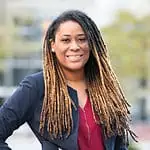Disrupting Educational Ableism & Racism: Disability, Race & Trauma in Schools
“Schools and the legal system tend to label these children as disobedient, disorderly, and dis/abled while simultaneously ignoring the voices of the children themselves. This pathologization then is perpetuated through the labeling, surveillance, and punishment of unwanted students along with the silencing of their voices.”
– Subini Ancy Annamma, in The Pedagogy of Pathologization: Dis/abled Girls of Color in the School-prison Nexus
In April 2021, AWN hosted a fireside chat with Mahlet Meshesha and Jilisa Milton on disability, race, and trauma in schools.
For many disabled people, school is not a safe place. Instead, it is a place where we are subjected to coercive and involuntary treatment, isolation and bullying from peers, abuse in the name of help, and constant surveillance and criminalization – all of which cause and exacerbate trauma. Black and Brown disabled students – especially those who face additional vectors of marginalization – face the brunt of ableism and racism in schools. How can neurodivergent and other disabled people make critical interventions and inroads into educational advocacy? How can we do anti-oppression, liberation-focused work within carceral spaces like the family regulation system, the legal system, and the educational system?
Corrected transcript coming soon.
Presenters
Mahlet Meshesha

Mahlet Meshesha, LCSW, is a school-based trauma therapist where she works with youth and families of Color. Her clinical practice is focused on decolonizing mental health treatment and addressing how oppressive structural and cultural factors impact mental health/wellness. She received her Masters of Social Work in 2019 from Boston University where she specialized in child trauma and social work leadership. Currently, she is obtaining her Master’s in public health at George Washington University.
Jilisa Milton

Jilisa Milton is an Alabama based civil rights attorney, policy analyst, social worker, racial justice activist, community organizer, and relational strategist. She has nearly a decade of experience working at the intersection of racial equity, critical race & feminist theory, poverty, criminal justice reform, mental health, and reproductive justice. Ms. Milton currently practices law in Alabama, implementing a project in the Black Belt that protects children with disabilities from entering the school to prison pipeline, and ensures access to disability-related legal services and health services.
Communication Access Team
- Gino Gouby - ASL interpretation
- Jeremy L. Brunson - ASL interpretation
- Rachel - ASL interpretation
- Cindy Thompson - CART captioning
